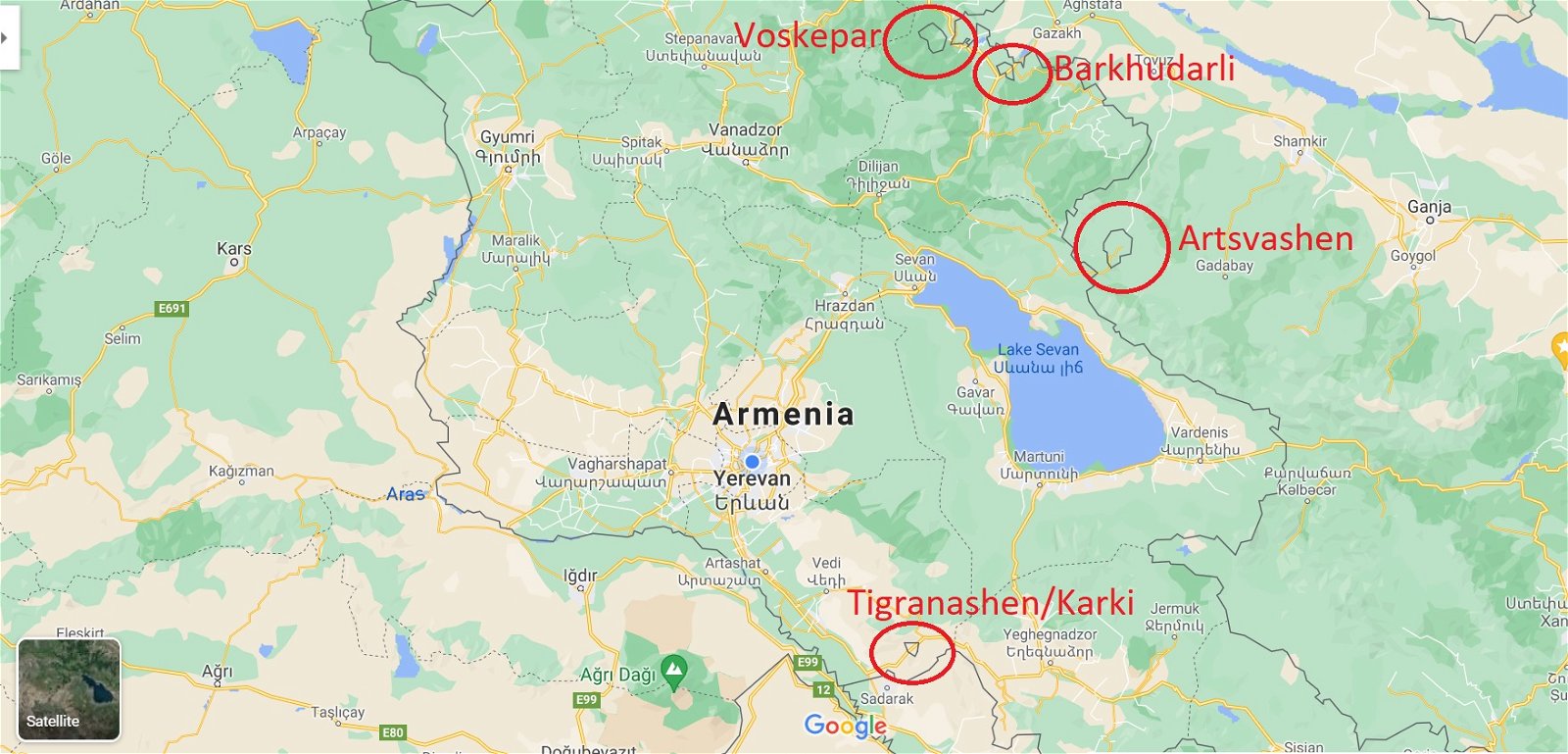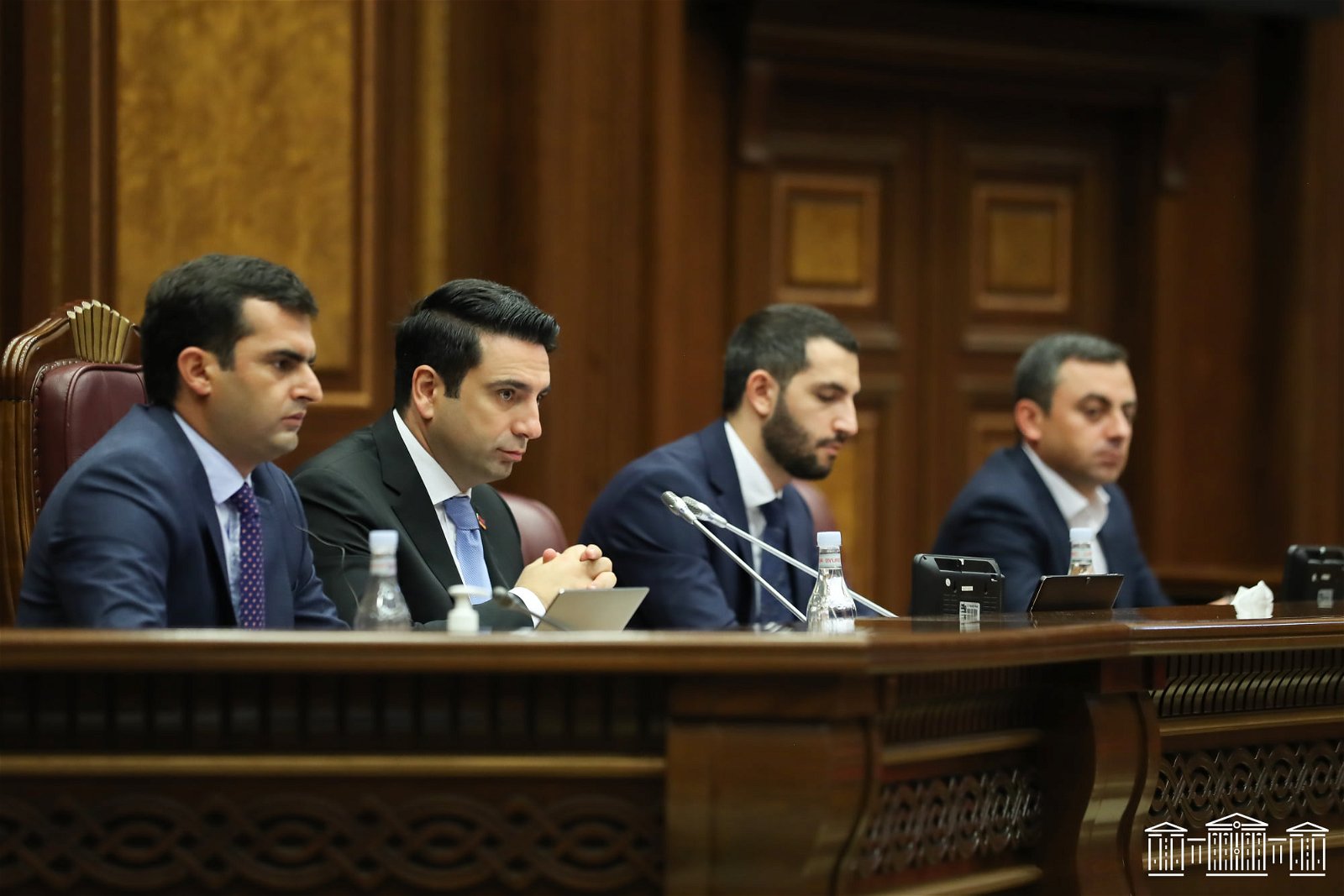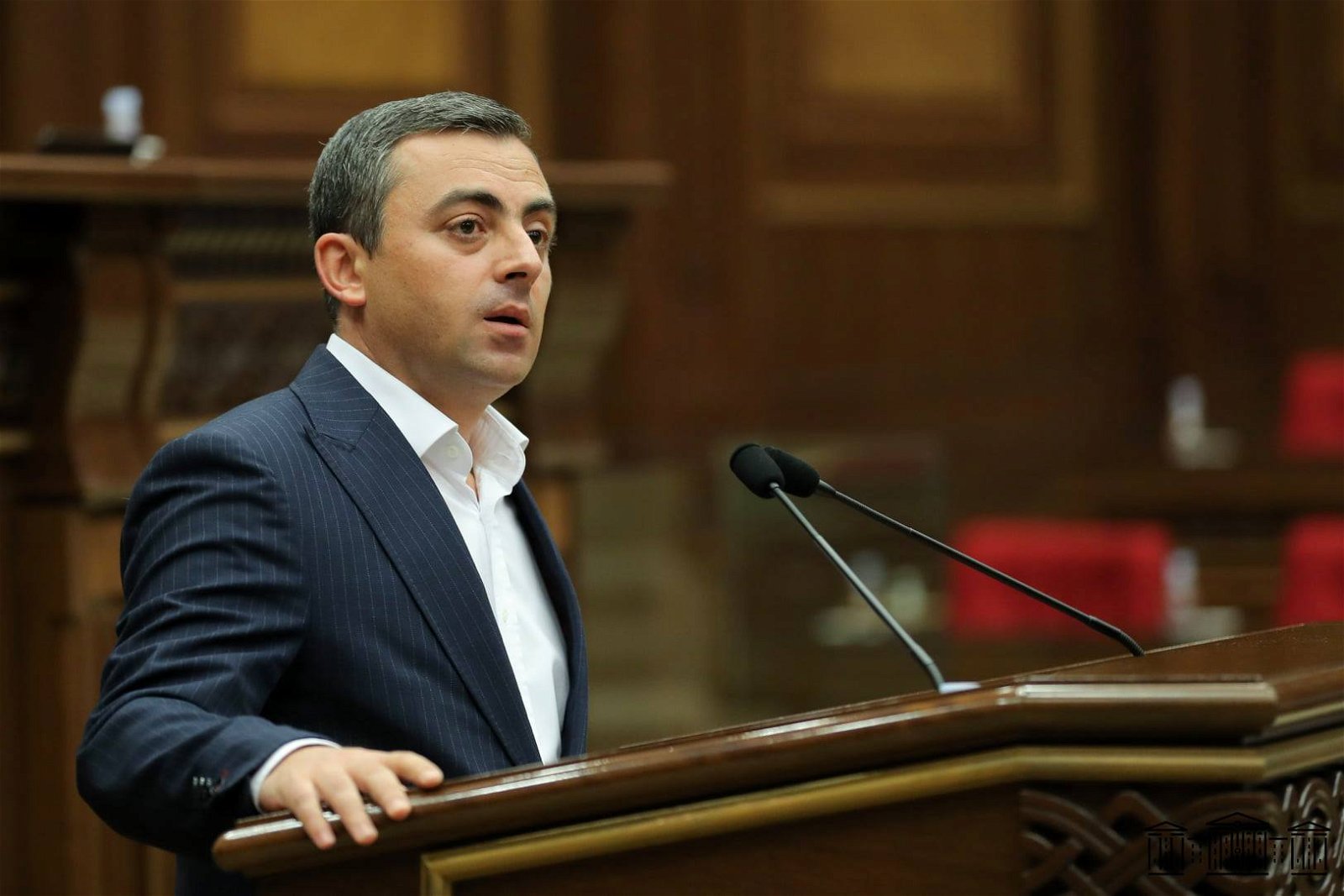The Ministry of Defense (MoD) of Armenia has confirmed the deployment of more Russian troops along the Armenia-Azerbaijan border.
The MoD has consistently denied the veracity of reports circulated on social media since spring regarding engineering works conducted by Russian soldiers in Armenia’s northeastern province Tavush. In March, it dismissed online rumors that “about 500 Russian peacekeepers and Azerbaijanis have been taking measurements along the border for already two days in the territory of several villages of Tavush region.”
On August 5, Hetq.am reported that Russian soldiers had set up a checkpoint in the Voskepar border community of Tavush and published videos of a Russian flag waving above a house along the Armenia-Georgia interstate road. The MoD confirmed the media reports that Russian border guards have been deployed in Voskepar and that “construction works are carried out for ensuring the rear facilities of the border guards.” The Ministry stated that these operations are carried out within the framework of Armenian-Russian cooperation.
PM Nikol Pashinyan has previously requested the deployment of Russian soldiers in the Syunik and Gegharkunik border provinces multiple times following the invasion of Armenia’s border regions by Azerbaijani soldiers on May 12. In late May, the PM’s Cabinet announced that territories in the Syunik communities of Kapan, Meghri and Tegh had been transferred to the protection of border guards of the Russian Federal Security Service “due to the necessity of strengthening the defense of Armenia’s southeastern border” in the aftermath of the 2020 Artsakh War. Under the November 9 trilateral ceasefire agreement, Azerbaijan gained control over extensive territory, including Zangelan, Qubatlu and Kelbajar, creating a new international border between Armenia’s eastern border provinces and Azerbaijan.
However as recently as August 5, Moscow had demurred to the suggestion of stationing Russian soldiers along the length of the Armenia-Azerbaijan state border. During an August 5 briefing, deputy director with the Russian Foreign Ministry Alexander Bikantov cited the “lack of international legal formalization” and “dearth of mutual trust between the sides” as impediments to the deployment of border guards. “We think that a sustainable de-escalation on the border can only be guaranteed by the immediate start of border delimitation between Azerbaijan and Armenia, followed by border demarcation,” he said.
Voskepar is one of three Azerbaijani enclaves that have been under de facto Armenian control since the collapse of the Soviet Union. While Armenia has retained jurisdiction over Voskepar, Barkhudarli and Tigranashen/Karki, Azerbaijan maintains control over the Armenian enclave Artsvashen. Versions of the ceasefire agreement leaked hours before its release included a reference to the return of “territories held by Armenia in the Gazakh region of Azerbaijan,” including Voskepar and Barkhudarli, that was excluded from the official document. On May 20, Pashinyan suggested that the issue of the enclaves might be addressed during the demarcation and delimitation process.
CivilNet editor Karen Harutyunyan criticized the absence of a principled approach to negotiations on the status of the enclaves. “Armenia’s major interstate road to Syunik, Artsakh and Iran passes through Tigranashen. Armenia’s other main interstate road, which goes to Georgia, passes through Voskepar,” he wrote in late June. “For Armenia, the three former Azerbaijani enclaves under its control have a much larger strategic importance than Artsvashen.”

While the PM has the right to launch negotiations with other countries on issues related to border clarification, any decision involving territorial changes must be approved by the public through a referendum, according to Article 205 of the RA Constitution. The decision to hold a referendum is adopted by the National Assembly.
Several senior members of the Ministry of Foreign Affairs (MoFA) of Armenia resigned in late May following Pashinyan’s announcement of his plans for de-escalation and border demarcation, including the deployment of Russian border guards and the possible exchange of enclaves. The MoFA had shared that they had no previous knowledge of a working agreement between Armenia, Azerbaijan and Russia establishing a joint commission for the demarcation and delimitation of the Armenia-Azerbaijan international border leaked on May 19.
During his resignation announcement on May 31, former Foreign Minister Ara Ayvazyan asserted that he resigned in order to “make sure that there are never any suspicions that this ministry could take some steps or agree to some ideas, initiatives, which go against our national and state interests.”
In a column published on June 24, four days after Pashinyan’s Civil Contract Party declared a victory in the extraordinary parliamentary elections, former deputy Foreign Minister Avet Adonts clarified the reasons behind the resignations, blaming “emotional and primitive one-man state governance” for the tragedies of the 44-day war and subsequent foreign policy failures. “Unfortunately, Armenia is becoming a tool for securing the interests of all parties, except for its own,” he wrote.
On July 14, Pashinyan appointed Armen Grigoryan as the first deputy Foreign Minister, a step that was seen as a prelude to his ultimate appointment to the head of the ministry. However, while Pashinyan assembled most of his cabinet in the days following his reappointment as PM on August 2, the post of Foreign Minister remains vacant. Under Article 150 of the Constitution, the PM must propose his ministerial candidates within a period of five days following his appointment.

The National Assembly is also in the process of determining the makeup of the leadership of the newly elected parliament. This week, Armenia Alliance deputy and chair of the Supreme Council of the Armenian Revolutionary Federation of Armenia Ishkhan Saghatelyan was elected deputy speaker of the National Assembly alongside Civil Contract Party deputies Ruben Rubinian and Hakob Arshakian. Notably, Saghatelyan thanked the citizens who voted for the Armenia Alliance rather than members of the parliament in his acceptance speech, stating, “You have given us a mandate, and we are obliged to fully represent you in the National Assembly.”




These are difficult times for us. We need national unity both within and outside Armenia. If it takes Russian peacekeepers to protect our borders for a limited while, so be it, till we are fully re-equipped to defend ourselves. Should not give up any of our historical territories. Should find a new approach to deal with Putin based on our mutual needs.
The Russians must be invited as required to protect Armenians borders.
Putin needs to realise that a strong huge improved technological Turkish military backed by a growing industrialised Turkish economy is feeding their Islamic allies all to the detriment of mother Russia and Armenia.
Putin needs to realised a growing powerful military in Turkey that is now not under the control of NATO with a Islamist in control and when can anyone trust the Turks with their history.
Putin also needs to realise that a China world power is more of a threat to mother Russia than NATO.
Why is this so. ? USA had the power to finish of Russia but they didn’t. What they did was the implementation of the Marshal Plan that built up Japan and Germany and gave the world a relative long peace.
As Russian cannot produce anything on the world market that can be sold except for weaponds China will overwhelm them soon.
The Russia-Armenia “alliance” is a FRAUD!
Armenia’s so-called “leaders” since 1990 have *ALL* been agents of Russia, working for Russian interests – AT THE EXPENSE OF ARMENIA’S INTERESTS – including the current brain dead parasite calling himself “Prime Minister”.
This is the MAIN reason no problems were ever solved and no problems are BEING solved. You cannot solve a problem when you don’t know that it exists. And this is the reason that the diaspora was largely kept out of Armenia’s decision making and growth, they always knew the FRAUD of Russia will be exposed.
Just as an example out of many: has any politician, leader, analyst, pundit, etc from Armenia (or for that matter even among our diaspora), ever sounded the alarm when British Petroleum and Azerbaijan built the pipeline going through Georgia, Turkey and on to Israel, that… RUSSIA WAS ALSO INVOLVED???????? And that such involvement is contrary to the relations between Armenia and Russia since that will ultimately harm Armenia?
And that is exactly what happened, and exactly why Russia HELPED Turkey and Azerbaijan to destroy Artsak. Azerbaijan for 15 years has been threatening Armenia while at the same time getting rich from pumping oil and preparing as a result of its oil revenue, and the COMPLETE IDIOTS of Armenia sat by doing nothing and plotting how they are going to swindle more diaspora money in the next scheme.
Russia along with its other puppet Central Asian turkic nations benefit from a pipeline that harms Armenia’s interests. And Armenia has its mouth shut. Russia needs Azerbaijan because Azeri Turks have a mission and plans. Russia doesn’t need Armenians one bit, because Armenians have no mission and no plans and having been “educated” by Soviet Russia, are inept at everything they do.
Agreed..It was Russia that thwarted Armenia from ever developing an oil pipeline being built directly from Iran. That is 100% true. Russia screws Armenia at every turn it can to keep it weak and dependent. It is no ally or friend. The real goal of the Turkish/Zio plan is to make sure Armenia never ever gains power or strength. That’s why they want a permanent wedge that they alone control between Armenia and Iran via Syunik via Azerbaijan. They understand an oil hub wealthy Armenia is a danger to the Zionist who concocted the Armenian genocide itself, and to the invading Turks that actually carried it out and enjoy the fruits of Armenian lands and wealth as a result. I see it clearly.